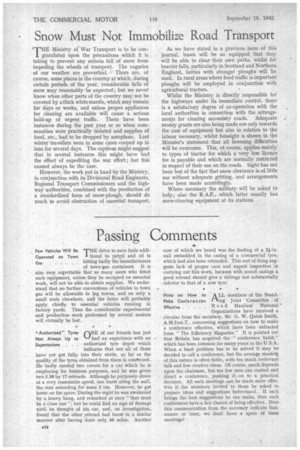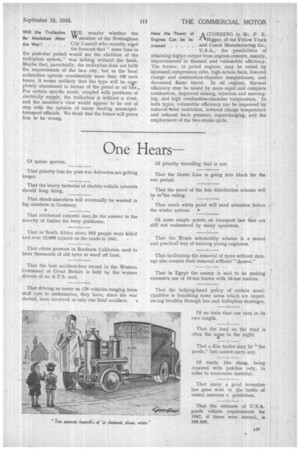Passing Comments Few Vehicles Will Be 'THE drive to save
Page 14

Page 15

If you've noticed an error in this article please click here to report it so we can fix it.
fuels addiOperated on Town I tional to petrol and oil is
Gas hitting badly the manufacturers of town-gas containers. It is also Very regrettable that so many users who fitted such equipment, unless they be occupied on essential work, will not be able to obtain supplies. We understand that no further conversions of vehicles to town gas will be allowable in big towns, and on only a small scale elsewhere, and the latter will probably apply chiefly to essential vehicles running in factory yards. Thus the considerable experimental and production work performed by several makers will virtually be lost.
H Authorized " Tyres Not Always Up to Expectations . . .
ONE of our friends has just had an experience with an authorized tyre depot which indicates that not all of these have yet got fully into their stride, so far as the quality of the tyres obtained from them is coneerned. He badly needed two covers for a car which he is employing for business purposes, and he was given two 5.50 by 17 retreads. Although he purposely drove at a very reasonable speed, lone burst along the wall, the rent extending for some 5 ins. However, he got home on the spare: During the night he was awakened by a heavy bang, and remarked at once "that must be a close one "; but he could find no sign of damage until he thought of his car, and, on investigation, found that the other retread had burst in a similar manner after having 'done only. 40 miles. Another
case of which we heard was the finding of a 2i-in. nail embedded in the casing of a commercial tyre, which had also been retreaded. This sort of thing suggests lack of proper care and expert inspection in carrying out this work, because with sound casings a good retread should. give a mileage not substantially inferior to that of a new tyre.
Hints on How to A LL members of the StandMake Conferences 1—ling Joint 'Committee of
Effective R oad Hauliers' National ' Organizations have received a circular from the secretary, Mr. G. W. ,Quick Smith, A.M.Inst.T., concerning suggestions on how to make a conference effective, which have been extracted from "The Efficiency Magazine." It is pointed out that Britain has acquired the '" conference habit," which has been common for many years in the U.S.A. When a hard problem has to be solved it may be decided tp call a conference, but the average meetirPg of.this nature is often futile, with too much irrelevant talk and few creative ideas. Of course, much depends upon the chairman, but too few men can control and direct a conference, pushing it on to a practical decision. All such meetings can be made more effective if the members invited to them be asked to prepare ideas and suggestions beforehand. If each brings the best suggestions he can make, then such conferences have a fair chance of being effective. Does . this communication from the secretary indicate that, sooner or later, we shall have a spate of these meetings?
Will the Trolleybus VVE wonder whether the Be Abolished After IT member of the Nottingham the War? . . . City Council who recently aited the forecast that " some time in the post-War period would see the abolition of the trolleybus system," was talking without the book. Maybe that, parochially, the trolleybus does not fulfil the requirements of the lace city, but as the local authorities operate considerably more than 100 such buses, it seems unlikely that the type will be completely abandoned in favour of the petrol or oil bus., For certain specific needs, coupled with problems of electricity supply, the trolleybus\ is without a rival, and the member's view would appear to be out of step with the opinion of many leading municipaltransport officials. We think that the future will prove him to be wrong.
How the 'Power of Engines Can be Increased
A CCORDING to Mr. P. E. riBiggar, of the Yellow Truck and Coach Manufacturing Co., U.S.A., the possibilities of obtaining higher output from engines concern, mainly, improvements' in thermal and volumetric efficiency. The former, in petrol engines, may be raised by increased compression ratio, high-octane fuels, lowered charge and combustion-chamber temperatures, and decreased flame travel. In oil engines, thermal efficiency may be raised by more rapid and complete combustion, improved mixing, 'injection and scavenging, and high" combustion-chamber temperature. In both types, volumetric efficiency can be improved by reduced -inlet restriction, lowered charge temperature and exhaust back pressure, supercharging, .and the employment of the two-stroke cycle.




















































